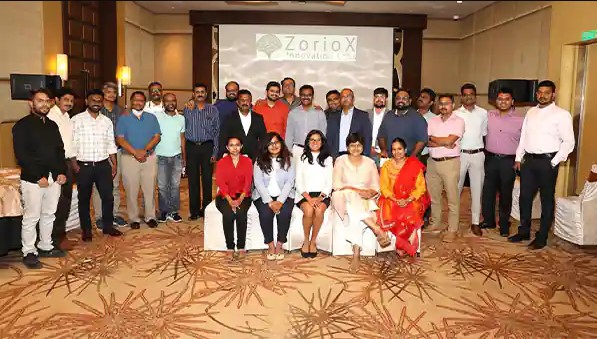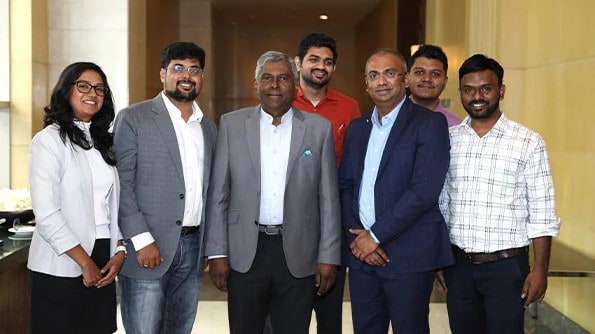Zoriox Innovation Labs is a medical device company founded by Dr. Karthik Balaji, Krishna Chaitanya Gurijala, and Krishna Vaka Reddy, with the Advisory Mentorship of Mr. Suyamburam Sathasivam (Vice President of Sun Pharmaceutical Industries Limited) of Indian origin, who has been collectively working with the breakthrough technology in Patient-Specific Implants (PSI) along with facial surgeons for the reconstruction of the face.
To give a 360-degree solution to Facial Reconstruction and its related demands, Zoriox has a team of surgeons, dentists, mechanical engineers, biomedical engineers, software engineers, graphic designers, prosthetists, and anatomists.
More in the News
Through 3D Printing Technology, Zoriox aims to increase access and cost, establish healthier communities, and make a healthy mind, body, and environment accessible to everyone, everywhere. The chance to better patient care via ongoing innovation and bridging the technological gap inspires the organization.
These implants are custom-made to each patient’s specifications; created by surgeons and aided by 3D printing technology, these cutting-edge implants are both patient-friendly and cost-effective. This approach eliminates the necessity for implants derived from healthy areas of the patient. The use of 3D-printed patient-specific implants in the treatment of facial disfigurations has been pioneered and improved by Zoriox Innovation Labs.
Zoriox has already manufactured over 270 implants and aided in surgically implanting them in patients all around India, as well as a handful in other areas of the world. Over the previous two years, Zoriox has thoroughly evaluated all finished cases. The summit was a huge success because of the information transfer that occurred throughout the panel discussions.
According to Prasanna Kumar T E K, CTO of Zoriox Innovation Labs, “the growth of technology continues to help the healthcare business overcome numerous difficulties that mankind faces on our planet.” Zoriox innovates every day to push ourselves.”
Facial disfigurement may be both sad and distressing. Cancer, tumors, infections, and accidents are the most common causes. The epidemic has resulted in an increase in incidences of facial disfigurement. This is caused by Mucormycosis, sometimes known as “black fungus,” which mostly affects the bones and soft tissues of the face. This, coupled with trauma, cancer, car accidents, and a variety of other factors, has pushed the function of face reconstructive surgery to the forefront in recent years. Oral-maxillofacial surgeons, once-surgeons, ENT, plastic, microvascular, neurosurgeons, general surgeons, prosthodontists, implantologists, and dental surgeons frequently collaborated to restore facial features which can be restored by facial reconstruction.
In order to repair the patient’s face, doctors had to transplant bones and replace components. This procedure entailed locating the’soul bone’ and anchoring the bone-implant to the receptor region. Aside from being invasive, the entire treatment was time-consuming. On March 6, 2022, a technical summit was organized in Chennai, India, with 53 notable surgeons to review advances in this sector and debate the overall efficacy of the treatment, with an emphasis on how to enhance the process further.
Surgeons from various areas who specialize in face reconstructive surgery gathered at ‘The Westin’ in Velachery, Chennai, India to explore the function of 3D-Printed Implants and strategies to improve their efficacy in the treatment of Mucormycosis and other cases of facial deformities. Dr. Gunaseelan Rajan, FRCS, PhD, D.Sc. presided over the convention, which drew on the experience of face surgeons from throughout India to provide useful ideas for further improving the implants. Various issues were raised about the design of patient-specific implants, surgical access, the direction of insertions, soft tissue closure, favorable wound healing, osseointegration, and prosthetic rehabilitation.
The summit was especially relevant to Generation Z young surgeons, who are aware with the arrival of AI in the medical profession and feel at home in the metaverse, which will allow the young surgeons to be taught in the metaverse environment. This will serve as an excellent educational tool, allowing them to witness real-time surgery from the comfort of their own homes or anywhere else; additionally, this platform will enable our surgeons to provide virtual counselling to patients regarding the ‘after effects’ of the surgery – was discussed.

These implants are custom-made to each patient’s specifications; created by surgeons and aided by 3D printing technology, these cutting-edge implants are both patient-friendly and cost-effective. This approach eliminates the necessity for implants derived from healthy areas of the patient. The use of 3D-printed patient-specific implants in the treatment of facial disfigurations has been pioneered and improved by Zoriox Innovation Labs.
Zoriox has already manufactured over 270 implants and aided in surgically implanting them in patients all around India, as well as a handful in other areas of the world. Over the previous two years, Zoriox has thoroughly evaluated all finished cases. The summit was a huge success because of the information transfer that occurred throughout the panel discussions.
According to Prasanna Kumar T E K, CTO of Zoriox Innovation Labs, “the growth of technology continues to help the healthcare business overcome numerous difficulties that mankind faces on our planet.” Zoriox innovates every day to push ourselves.”
Facial disfigurement may be both sad and distressing. Cancer, tumors, infections, and accidents are the most common causes. The epidemic has resulted in an increase in incidences of facial disfigurement. This is caused by Mucormycosis, sometimes known as “black fungus,” which mostly affects the bones and soft tissues of the face. This, coupled with trauma, cancer, car accidents, and a variety of other factors, has pushed the function of face reconstructive surgery to the forefront in recent years. Oral-maxillofacial surgeons, once-surgeons, ENT, plastic, microvascular, neurosurgeons, general surgeons, prosthodontists, implantologists, and dental surgeons frequently collaborated to restore facial features.
In order to repair the patient’s facial reconstruction, doctors had to transplant bones and replace components. This procedure entailed locating the’soul bone’ and anchoring the bone-implant to the receptor region. Aside from being invasive, the entire treatment was time-consuming. On March 6, 2022, a technical summit was organized in Chennai, India, with 53 notable surgeons to review advances in this sector and debate the overall efficacy of the treatment, with an emphasis on how to enhance the process further.
Surgeons from various areas who specialize in face reconstructive surgery gathered at ‘The Westin’ in Velachery, Chennai, India to explore the function of 3D-Printed Implants and strategies to improve their efficacy in the treatment of Mucormycosis and other cases of facial deformities. Dr. Gunaseelan Rajan, FRCS, PhD, D.Sc. presided over the convention, which drew on the experience of face surgeons from throughout India to provide useful ideas for further improving the implants. Various issues were raised about the design of patient-specific implants, surgical access, the direction of insertions, soft tissue closure, favorable wound healing, osseointegration, and prosthetic rehabilitation.
The summit was especially relevant to Generation Z young surgeons, who are aware with the arrival of AI in the medical profession and feel at home in the metaverse, which will allow the young surgeons to be taught in the metaverse environment. This will serve as an excellent educational tool, allowing them to witness real-time surgery from the comfort of their own homes or anywhere else; additionally, this platform will enable our surgeons to provide virtual counselling to patients regarding the ‘after effects’ of the surgery – was discussed.
The introduction of 3D printing technology, biocompatible titanium, medical design tools, and virtual surgical platforms has transformed the area of facial reconstruction surgery. The following are the key benefits of their products: surgical time is greatly reduced, any design can be incorporated and manufactured as required, the cost to the doctor is reduced, post-surgery complications are greatly reduced, only minimal armamentarium is required, does not involve surgical complexity, any bone surface can be easily implanted, retention can be easily achieved from any bone, faster healing and loading times, no need for bone grafting procedures, t Inert To human body fluids – biological inertness, high degree of biocompatibility and biointerfacing (less implant rejection by bone and soft tissue), high osseointegration value due to high wettability, strong bond formation with phosphates and calcium ions in bone, non-toxic and non-carcinogenic than plastics and other metals
Subscribe to AM Chronicle Newsletter to stay connected: https://bit.ly/3fBZ1mP
Follow us on LinkedIn: https://bit.ly/3IjhrFq
Visit for more interesting content on additive manufacturing: https://amchronicle.com/



